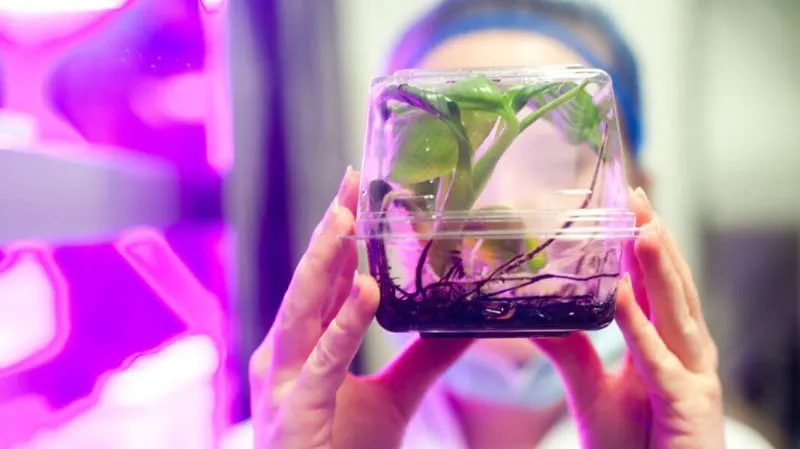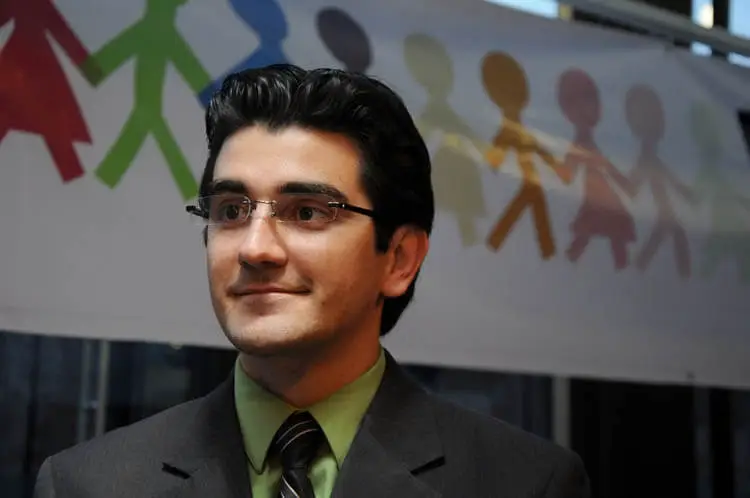Latin American researchers use gene editing to breed hardier crops
Latin American researchers use gene editing to breed hardier crops


Among them are Claudia Stange Klein, a professor in the Department of Biology of the Faculty of Sciences at the University of Chile, who is currently using CRISPR to breed tomato and kiwi varieties that can tolerate drought and soil salinity. She is also editing apples to increase their nutritional profile with a higher content of carotenoids and resist the oxidation that causes browning after they are cut.

Paul Chavarriaga, leader of the International Center for Tropical Agriculture (CIAT’s) Genetic Transformation and Genome Editing Platform in Colombia, is focusing on improving rice, beans, cassava and cacao. The research on rice is intended to breed resistance to the white leaf virus, a very common disease in Latin America that kills the leaves of the plant and adversely affects yields. Consumers ultimately will benefit from the team’s work to improve the digestibility of beans. With cacao, the source of chocolate, they are targeting the genes responsible for the roots absorbing heavy metals in a bid to reduce the amounts of toxic metals in harvested cacao seeds.
Alejandro Hernández, a research professor in genome editing and bioinformatics at TEC University in Costa Rica, is focusing on rice, yeast and banana. He discovered that banana has a gene that may naturally confer resistance to several plant diseases. However, the gene has a low presence in the genome, so he is trying to develop varieties where that gene is more pronounced.

Genome editing allows scientists to develop new crop varieties more quickly than other plant breeding tools, Hernandez explained, so they are ready for farmers in a shorter period of time. This is important, because farmers urgently need seeds that can withstand the climate change effects already present in the Latin American region.
Hernandez is awaiting approval to conduct field trials on his research under the current regulatory process in Central America.
Hernandez explained that although gene-edited crops are developed in laboratories, the process itself is not new to humans or nature. Similar changes happen naturally through sporadic mutations in a few genes. As a result, gene-edited crops cannot easily be distinguished from crops obtained through a sporadic mutation, a scenario with legal implications in the biosafety regulatory process.
Regulation in the region is playing a central role in the development of gene-edited crops. In general, the Latin American countries that have a regulation in place addressing new breeding technologies (NBTs), such as crops developed using CRISPR, have created a flexible regulatory framework. Such a framework can boost investment in the region to create new crop varieties.
The panelists agreed that it is fundamental to treat these crops differently than transgenics (GMOs) from a regulatory point of view. They said it is important for scientists to lead the narrative about this new technology to avoid having others speak on their behalf and spread misinformation. Such a situation happened with GMOs over the past 25 years, blocking access to innovation in much of the region. But now scientists have the chance to speak out and share information, not myths, they said.
Luis Ventura is a biologist with expertise in biotechnology, biosafety and science communication, born and raised in a small town near Mexico City. He is a Plant Genetic Resources International Platform Fellow at the Swedish University of Agricultural Sciences. Follow him on Twitter @luisventura
A version of this article was originally posted at the Cornell Alliance for Science and has been reposted here with permission. The Cornell Alliance for Science can be found on Twitter @ScienceAlly

 | Videos | More... |

Video: Nuclear energy will destroy us? Global warming is an existential threat? Chemicals are massacring bees? Donate to the Green Industrial Complex!
 | Bees & Pollinators | More... |

GLP podcast: Science journalism is a mess. Here’s how to fix it

Mosquito massacre: Can we safely tackle malaria with a CRISPR gene drive?

Are we facing an ‘Insect Apocalypse’ caused by ‘intensive, industrial’ farming and agricultural chemicals? The media say yes; Science says ‘no’
 | Infographics | More... |

Infographic: Global regulatory and health research agencies on whether glyphosate causes cancer
 | GMO FAQs | More... |

Why is there controversy over GMO foods but not GMO drugs?

How are GMOs labeled around the world?

How does genetic engineering differ from conventional breeding?
 | GLP Profiles | More... |

Alex Jones: Right-wing conspiracy theorist stokes fear of GMOs, pesticides to sell ‘health supplements’




 Trust issues: What happens when therapists use ChatGPT?
Trust issues: What happens when therapists use ChatGPT? Fighting deforestation with CO2: Biotechnology breakthrough creates sustainable palm oil alternative for cosmetics
Fighting deforestation with CO2: Biotechnology breakthrough creates sustainable palm oil alternative for cosmetics California, Washington, Oregon forge immunization alliance to safeguard vaccine access against federal undermining
California, Washington, Oregon forge immunization alliance to safeguard vaccine access against federal undermining Viewpoint — Fact checking MAHA mythmakers: How wellness influencers and RFK, Jr. undermine American science and health
Viewpoint — Fact checking MAHA mythmakers: How wellness influencers and RFK, Jr. undermine American science and health 30-year-old tomato line shows genetic resistance to devastating virus
30-year-old tomato line shows genetic resistance to devastating virus Viewpoint: Video — Big Solar is gobbling up productive agricultural land and hurting farmers yet providing little energy or sustainabilty gains
Viewpoint: Video — Big Solar is gobbling up productive agricultural land and hurting farmers yet providing little energy or sustainabilty gains The free-range chicken dilemma: Better for birds, but with substantial costs
The free-range chicken dilemma: Better for birds, but with substantial costs ‘You have to treat the brain first’: Rethinking chronic pain with Sanjay Gupta
‘You have to treat the brain first’: Rethinking chronic pain with Sanjay Gupta
